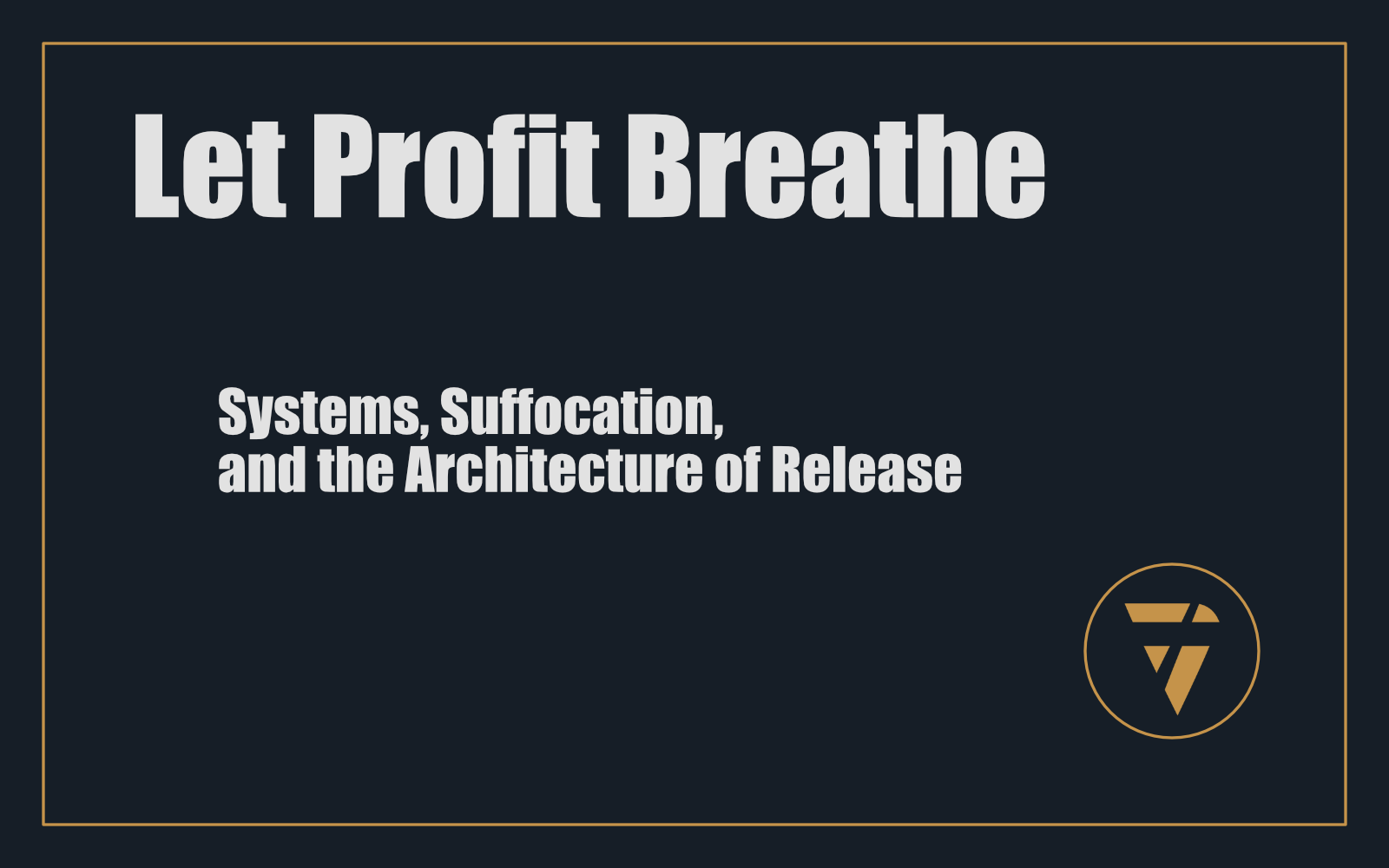Let Profit Breathe

Systems, Suffocation, and the Architecture of Release
Profit is oxygen. It sustains life, growth, and motion. Yet everywhere we look—in our markets, in our governance, in our social systems—we see oxygen rationed. Not by scarcity, but by design. Gates, permissions, and controls. Protection masquerading as prudence. Manipulation masquerading as order.
We’ve inherited a world where profit does not breathe. It chokes. And that suffocation is not an accident—it's architecture.
The structures we live under—capital markets, governance institutions, social hierarchies—are not neutral. They were built by operators who understood one law: control profit, and you control people. Deny access, and you create dependency. Ration oxygen, and you decide who breathes.
But here’s the inversion: suffocation does not create power. It creates fragility. The most controlled systems are the most brittle. The most manipulated markets collapse under their own weight. The most gatekept communities are the first to fracture. What survives, what compounds, is not control—it’s release.
This is the law: when profit breathes, it multiplies.
The Functional Market System: From Flow to Friction
Markets should be simple. They exist to match value with demand. In their purest form, they are rivers—profit flowing freely to where it is needed, rewarding those who create, scaling those who solve.
But look closer at our functional market systems today. They do not look like rivers. They look like dams.
Monopolies do not innovate—they accumulate. Gatekeepers do not accelerate—they extract. Distribution networks are designed not for motion, but for margin.
Take e-commerce. What began as liberation—digital storefronts bypassing physical walls—has now ossified into platform monopolies. Sellers suffocate under fees, algorithmic manipulation, and dependency on systems they do not own. The oxygen of profit is rationed. Motion is taxed.
The result? Entrepreneurs who should be scaling suffocate instead. Capital that should be compounding drifts into dead systems. Entire markets stall under the weight of their own gatekeepers.
The lever here is deletion, not negotiation. Remove the friction, remove the gate, remove the platform monopoly. Let the transaction flow directly between maker and buyer. Install compression, not committees. Profit does not need permission.
Governance: The Theatre of Delay
Governance, at its root, should compress decision into clarity. Leaders decide, systems execute, citizens move. Instead, governance has become theatre—designed not to release motion, but to delay it.
Layers of bureaucracy masquerade as diligence. Committees masquerade as consensus. Endless consultation masquerades as inclusion. What it really is: latency. Delay. Drag.
Every governance system, from corporate boards to national legislatures, carries the same disease. They no longer exist to make decisions. They exist to protect themselves.
The billable-hour model of consulting was the same. It scaled latency, not leverage. Advice became a way to avoid action. Reports replaced results. Whitepapers became the end product, not the beginning of consequence.
But governance by latency collapses under its own weight. Just as McKinsey lost without knowing, so will any governance system that treats delay as virtue. In a compressed world, where cycles are measured in weeks not decades, latency is death.
The lever here is compression. Governance must be rebuilt as protocol, not parliament. Code, not committee. Ledger, not legislation. Systems that delete decisions, not delay them.
Profit breathes when governance compresses.
Social Systems: Belonging as Permission
Finally, our social systems—the most suffocating of all.
Community should be the place where belonging is unconditional, where participation is natural, where trust multiplies. Instead, modern social systems are permissioned hierarchies. Status is gatekept. Opportunity is rationed. Identity is manipulated.
This is true in corporations, where belonging is tied to titles and org charts. It is true in online networks, where visibility is decided by algorithmic priests. It is true in communities, where access is permissioned by those who already sit at the table.
Social oxygen is suffocated by scarcity thinking. If everyone belongs, then no one is special. If everyone profits, then no one controls. That’s the lie.
In truth, the systems that distribute belonging most freely are the systems that endure. The most open networks win. The most transparent economies thrive. The most inclusive communities create the deepest profit.
Profit breathes when belonging is structural, not conditional. When transparency is not optional, but mandatory. When equity is not charity, but law.
The Core Inversion: Control vs. Flow
Here’s the hard truth: protection is decay in disguise. Manipulation is drag. Gatekeeping is suffocation.
Every system that prioritises control over flow is fragile. It may look strong in the short term—stable, ordered, predictable. But beneath the surface, it's brittle. Because the oxygen of profit is being rationed. And suffocated systems always collapse.
The systems that endure are those that release. That let profit flow like oxygen across markets, through governance, into society. Not as charity, not as redistribution, but as architecture.
This is the essence of leverage. Not control. Compression. Multiplication. Release.
The Three Moves of Release
How do we let profit breathe? How do we dismantle the suffocation built into our markets, governance, and social systems?
It requires three moves.
- Deletion before addition
Do not add new rules, new layers, new systems. Delete the gates. Delete the middle layers. Delete the rituals of delay. Every unnecessary approval, every redundant report, every gatekeeper is suffocation. Strip it out. - Compression as governance
Rebuild governance not as theatre, but as architecture. Protocol instead of permission. Ledgers instead of laws. Compression instead of committee. Systems should collapse decisions, not extend them. - Profit as common wealth
Not charity. Not philanthropy. Structure. Build systems where profit is distributed as law, not favour. Where transparency is mandatory. Where equity is the engine. Profitism is not theory—it's architecture.
The Consequence of Release
If we let profit breathe, everything changes.
Markets move faster. Governance compresses instead of delaying. Social systems integrate instead of excluding. Capital flows to the most productive, not the most protected. Communities scale trust instead of rationing it.
If we refuse—if we cling to control, protection, manipulation—the consequence is collapse. Monopolies die under their own weight. Bureaucracies rot from delay. Social systems fracture into irrelevance.
This is not speculation. It's history. Every empire that suffocated profit collapsed. Every system that released it multiplied.
The question is not whether suffocating systems will fall. The question is whether you will build the replacements.
Your Lever Now
You see suffocation in your functional markets, your governance, your social systems. Good. Clarity precedes consequence.
Now the lever is yours. Audit where in your world profit is being suffocated. Strip it out. Replace gates with flow. Replace permission with protocol. Replace protection with release.
Because profit is not a prize. It's oxygen. And if you do not let it breathe, it will suffocate you too.
This is what I’m working on. Tell me what you think, I enjoy the conversation! Subscribe and follow the work in real time.
Thanks!
B

Profit isn’t dying.
It’s being suffocated by control, gates, and manipulation.
Let it breathe.
PS -






